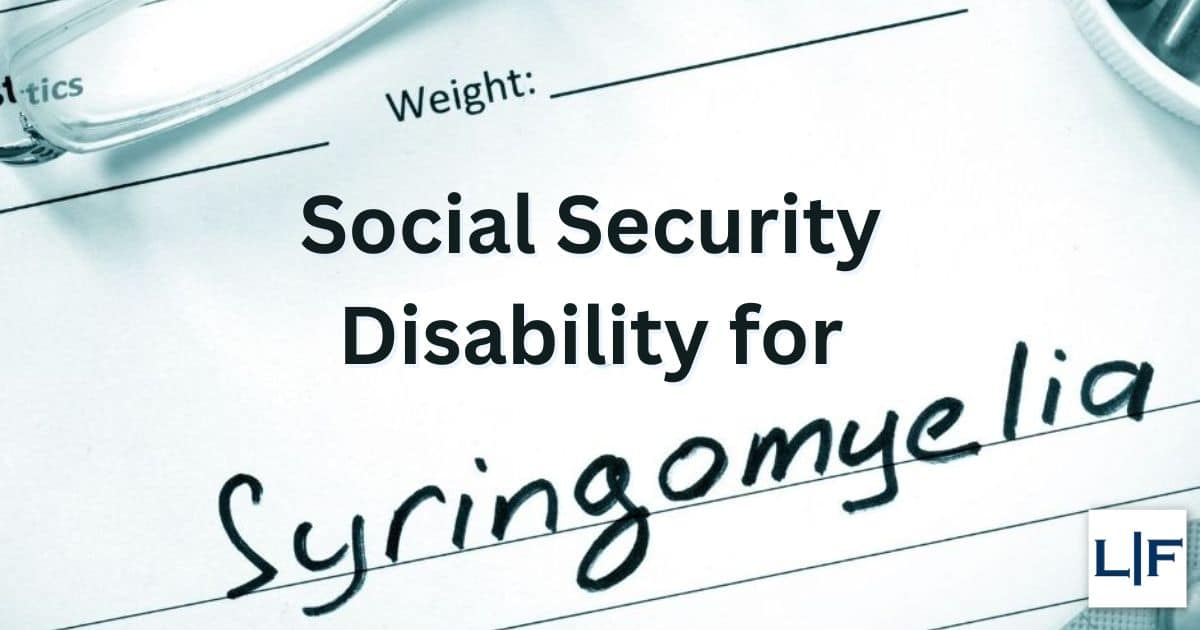Getting social security disability for syringomyelia can be a frustrating process, The Social Security Administration (SSA) has very stringent guidelines for evaluating applicants for benefits. The SSA approves less than a third of applications initially, according to a statistical report.
Syringomyelia, a disorder that forms in the spinal cord, is chronic and progressive in nature. Symptoms typically develop slowly over time and can become increasingly disabling. When a person with syringomyelia begins to suffer loss of motor function or impaired vital functions, she may be eligible to receive Social Security disability benefits.
If you have been diagnosed with syringomyelia, call our disability lawyer in Raleigh at Lunn & Forro, PLLC to discuss your case. If you qualify for benefits, we can help you with the application process, work to prove your case, and expedite your benefits. Call us today for a free consultation: 888-966-6566.
How is syringomyelia disabling?
Not all people with the condition develop symptoms; some have long periods of functional stability. However, the symptoms will typically take root over time and continue to worsen.
Below are some of the symptoms that can become disabling for people living with syringomyelia:
- Pain in the neck that radiates down the arms and legs
- Muscle weakness, muscle spasms, muscle tightness
- Loss of sensation, numbness, tingling
- Loss of reflexes, decreased coordination
- Loss of bowel and bladder function
- Scoliosis
- Difficulty walking
- Decreased use of arms and legs
Doctors will often recommend surgery as treatment for syringomyelia, but it is not always effective. It may help to slow or stabilize the progression of the disease, though.
Is syringomyelia included in the SSA’s listing of impairments?
Syringomyelia is included in Section 11 – Neurological of the SSA’s listing of impairments. The SSA will deem this condition as a qualifying disability when it is characterized by one of the following:
Significant bulbar signs: Syringomyelia can affect the bulbar muscles that connect to the brain stem and control vital functions such as breathing, swallowing, and speaking. You can qualify for disability benefits if you have significant impairments with these functions.
Disorganization of motor function: You can also qualify if you have “significant and persistent disorganization of motor function in two extremities,” such as your hands and feet, that results in “sustained disturbance of gross and dexterous movements.”
Impairments usually include signs and symptoms such as paralysis, tremors, sensory impairments, and involuntary movements.
Even if your syringomyelia does not quite fit these requirements, you may still qualify for disability if you cannot work. If you can prove to the SSA that your limitations are such that there is no job you are capable of doing, it might still approve your benefits.
What are the criteria for Social Security disability benefits?
There are a few basic – but strict – criteria you need to meet in order to qualify for benefits. You must be able to answer “Yes” to each of the following questions:
- Does a doctor expect your condition to last a year or longer or result in death?
- Does your condition interfere with basic work-related activities?
- Is your monthly income below the allotted $1,130 threshold?
- Does your condition interfere with the work you did previously?
- Is your condition such that you cannot adjust to any other type of work?
You must also meet criteria specific to the type of Social Security disability benefits you are pursuing. If you are pursuing Social Security Disability Insurance (SSDI), you must have sufficient work credits, which you earn every year you are gainfully employed. If you are pursuing Supplemental Security Income (SSI) – benefits intended for low income individuals who are disabled – you must meet income and resource requirements.
How do I prove that I meet the above requirements for benefits?
The primary way that you will substantiate your disability claim is with medical evidence. You need adequate proof from reliable medical sources that demonstrates that you have syringomyelia, it meets the aforementioned medical criteria, and/or the limitations of your condition render you unable to do any type of work.
You will need to share your medical records with the SSA and any pertinent physician notes, prognoses, and treatments. Your records should include diagnostic test results such as from magnetic resonance imaging (MRI). Doctors use MRIs to diagnose syringomyelia because they show the cysts (syrinx) in the spine, as well as the presence of any tumors. When the MRI technologists takes images in rapid succession, the results can even show the fluid flowing around spinal cord within the syrinx.
We help our clients gather the medical evidence necessary to prove their disability, as well as other input from acceptable sources about limitations that can help support the clam.
The SSA denied my application. What do I do now?
If the SSA denied your application, you have 60 days from the time you received the denial letter to request a reconsideration if you disagree with the SSA’s decision.
If you have yet to consult with a lawyer, do so before you move forward. Requesting that the Administration reconsider its decision allows you an opportunity to provide additional supportive evidence and explain more clearly why your condition keeps you from working. If you proceed without ample evidence to back up your case, the SSA will deny your case again. An attorney can ensure that your evidence is valid and useful for your claim. And if the SSA again denies your claim, you can pursue additional levels of appeals with help from your lawyer.
Request a FREE consultation with a disability lawyer in Raleigh today.
You are welcomed to call and speak to a disability lawyer, free of charge, at Lunn & Forro, PLLC to discuss your syringomyelia case. We can help you gather the necessary evidence, prove your case, and get the benefits you need. Contact us today at 888-966-6566.
Related Posts

When am I Considered Disabled by Social Security?
Social Security considers you to be disabled when you have a serious medical condition that prevents you from working. To determine whether a person is

What Is SSI?
Supplemental Security Income (SSI) is a safety net for certain individuals with low income and little assets. SSI provides money so these people can meet

What Is SSDI – Social Security Disability Insurance?
SSDI, which is also called Social Security Disability Insurance, is a government program that gives disabled American workers a monthly income. When you suffer from

Can You Receive Inheritance While on Social Security Disability?
Yes. Inheritance can affect Social Security disability benefits. Much depends on the type of benefit you receive. Below, we discuss the implications of inheritances in
Can I Qualify for Both SSI and SSDI Disability Benefits?
Yes. In some cases, you may be able to qualify for both Supplemental Security Income (SSI) and Social Security Disability Insurance (SSDI) benefits. The Social
What are the Disability Listings for a Social Security Claim?
The disability listings can make it easier for you to qualify for Social Security disability benefits. If you are considering filing an application for Social
How Do I File a Disability Appeal?
You gave Social Security Disability all the information they asked for and agreed to a medical exam, but your disability claim was still denied. It
What If I Miss My Social Security Appeal Deadline?
What is the Social Security Disability Appeal Deadline? The most common Social Security Disability appeal deadline is 60 days. If your initial claim is denied,



